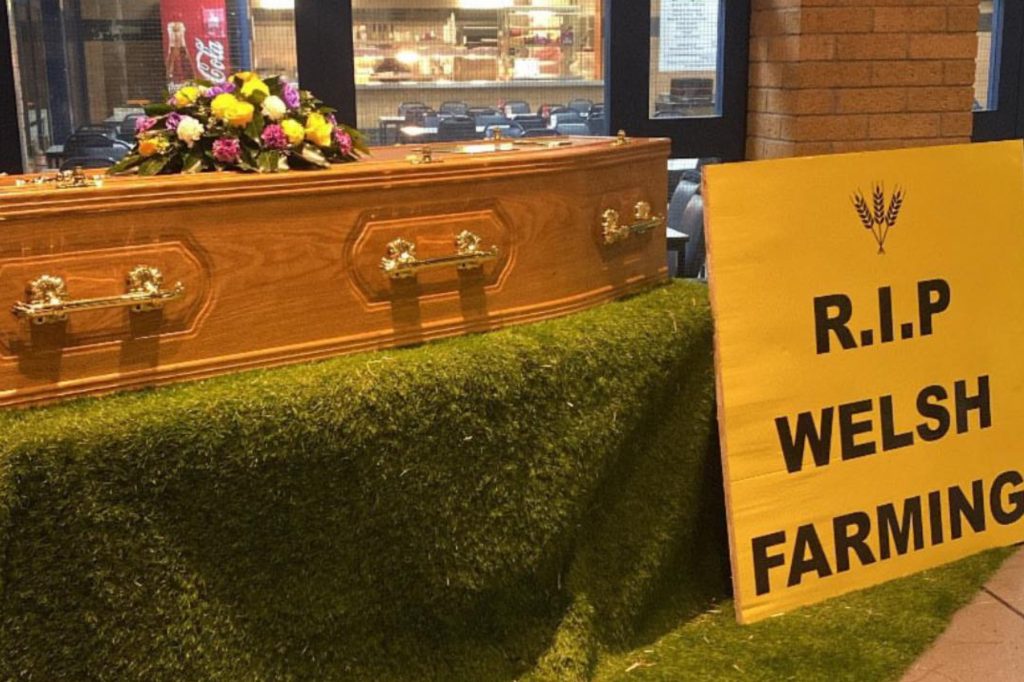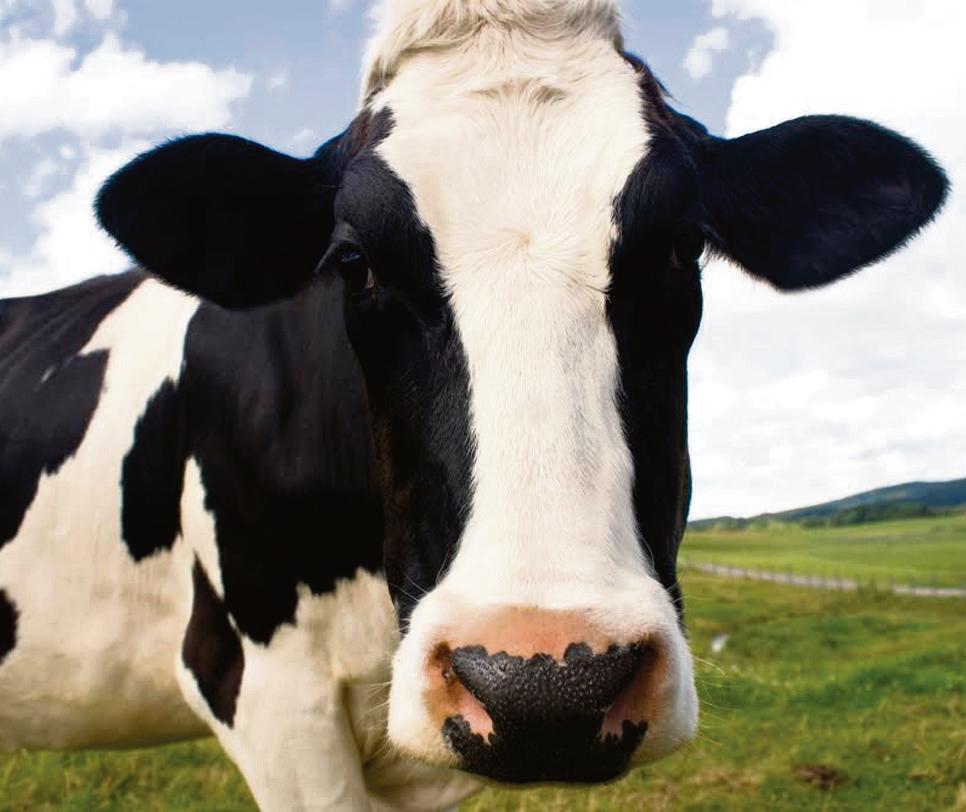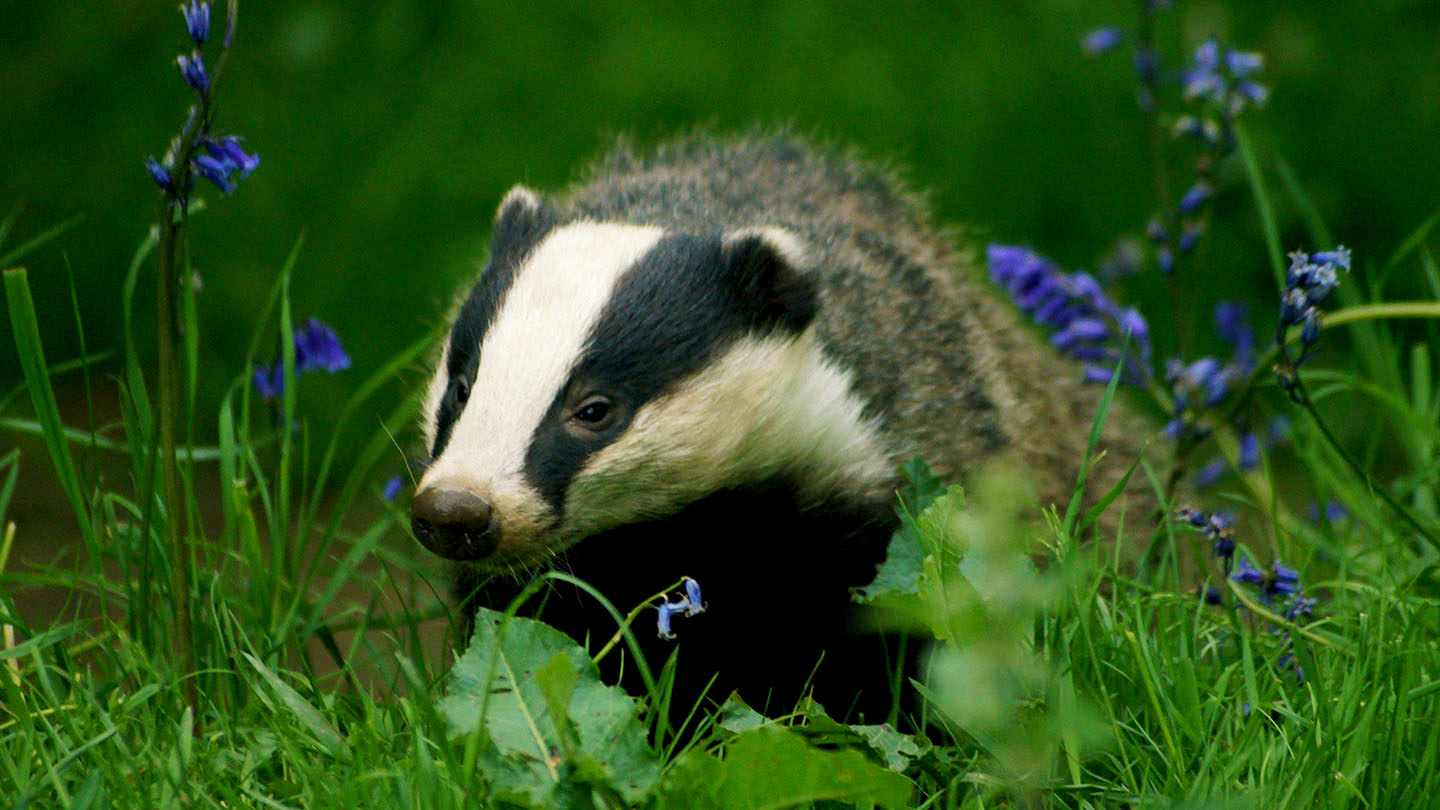Farming
Huge turnout in Carmarthen as Welsh farmers protest government reforms

APPROXIMATELY 3,000 Welsh farmers and their supporters converged at the Carmarthen showground in Nantyci this week (Feb 8), voicing their stern opposition against the planned reforms by the Welsh Government.
This significant gathering followed a similarly packed meeting in Welshpool last week, which saw over 1,000 attendees.
The protests have been ignited by the Welsh Government’s proposed changes to farming policies, aimed at encouraging “sustainable” agricultural practices. Under the new subsidy scheme, set to be implemented from 2025, farms would need to dedicate 10% of their land to tree planting and another 10% to wildlife habitats to qualify for payments. These measures are part of a broader effort to combat climate change and biodiversity loss.

However, the reforms have been met with widespread criticism from the farming community.
A mock coffin, bearing the inscription “In memory of Welsh farming,” was paraded by protestors at the demonstration, symbolising the perceived threat to the industry. Signs with messages like “RIP Welsh farming” and “no farmers, no food” were also prominently displayed, underscoring the deep concerns within the agricultural sector.
The Welsh Government has urged farmers to engage in the ongoing consultation process regarding the reforms, suggesting that changes to the plans could still be made. Despite this, the sentiment on the ground reflects a profound fear of the future, with many farmers feeling the new requirements would impose unmanageable burdens and significantly increase administrative work.
The farming industry’s leaders have not minced words, describing the current moment as a “crunch point” for Welsh agriculture. They argue that the scheme’s rigid requirements on tree and habitat creation, coupled with the lack of clear details on payment rates, will have disastrous effects on farm businesses. An impact assessment accompanying the consultation predicted a substantial reduction in livestock numbers and a potential loss of 5,500 jobs, further exacerbating the industry’s anxieties.
In response to the mounting pressure, the Welsh Government, represented by Rural Affairs Minister Lesley Griffiths, has acknowledged the sector’s concerns, emphasising the importance of the consultation process and suggesting that adjustments to the proposals are likely. The government insists that the Sustainable Farming Scheme (SFS) aims to ensure the long-term viability of Welsh farming, alongside environmental sustainability.
Nevertheless, the farming community remains skeptical. The current and final consultation period represents a critical juncture for Welsh farmers to express their concerns and potentially influence the future direction of agricultural policy in Wales. With a history of farming that runs deep in the Welsh countryside, the outcome of this dispute will undoubtedly have far-reaching implications for the region’s rural economy and way of life.
Samuel Kurtz MS, said on X: “Immensely proud and in awe of every farmer at Carmarthen Mart tonight. The sleeping dragon that is rural Wales is awakening after years of neglect by Labour.
“Fed up, frustrated but not taking a backward step.”
The Welsh Conservatives say that the Labour Government does not listen to Welsh farmers. “The farming community is understandably frustrated at being ignored for so long”, they said on social media.
WELSH FARMERS AT A CROSS ROADS
With just a month remaining in the final consultation period for the Sustainable Farming Scheme (SFS), agricultural leaders in Wales have sounded the alarm, declaring the sector at a critical juncture. The scheme, which has been under development following the Welsh Government’s commitment to sustainable agriculture, faces mounting scrutiny from the farming community. Concerns hinge on the government’s insistence on a 10% land allocation for both tree planting and habitat creation, with many in the sector calling for a reconsideration of these requirements amid fears of significant operational and financial impacts.
The Farmers’ Union of Wales (FUW) has been at the forefront of opposition, highlighting the scheme’s potential to cause a near 10.8% reduction in livestock numbers and an 11% decrease in agricultural labor, equating to an estimated £199 million loss in farm business income. FUW President Ian Rickman emphasised the urgency of the situation, urging all stakeholders to engage in the consultation process to advocate for necessary adjustments to the scheme.
Amidst this backdrop of concern, individual farmers like Tudur Parry, a dairy, beef, and sheep farmer from Caernarfon, express apprehension towards the SFS’s rigidity, particularly around land use for trees and habitats. Parry’s concerns reflect a broader sentiment that the scheme’s current form could undermine the viability of traditional farming operations in Wales.
The consultation process has also shed light on the anxiety permeating the farming community, with only a fraction of attendees at a recent FUW meeting indicating their willingness to participate in the SFS under its present conditions. This reluctance underscores the perceived incompatibility of the scheme with
Farming
Welsh Conservatives warn climate plans could mean fewer livestock on Welsh farms

THE WELSH CONSERVATIVES have challenged the Welsh Government over climate change policies they say could lead to reductions in livestock numbers across Wales, raising concerns about the future of Welsh farming.
The row follows the Welsh Government’s decision, alongside Plaid Cymru and the Welsh Liberal Democrats, to support the UK Climate Change Committee’s Fourth Carbon Budget, which sets out the pathway towards Net Zero greenhouse gas emissions by 2050.
The Carbon Budget, produced by the independent Climate Change Committee (CCC), states that meeting Net Zero targets will require a reduction in agricultural emissions, including changes to land use and, in some scenarios, a reduction in livestock numbers.
During questioning in the Senedd, the Welsh Conservatives pressed the Deputy First Minister and Cabinet Secretary for Climate Change and Rural Affairs on whether the Welsh Government supports reducing livestock numbers as part of its climate strategy.
Speaking after the exchange, Welsh Conservative Shadow Cabinet Secretary for Rural Affairs, Samuel Kurtz MS, said the Welsh Government could not distance itself from the implications of the policy it had backed.
Mr Kurtz said: “By voting in favour of these climate change regulations, Labour, Plaid Cymru and the Liberal Democrats have signed up to the UK Climate Change Committee’s call to cut livestock numbers in Wales, and they cannot dodge that reality.
“The Deputy First Minister’s smoke-and-mirrors answers only confirm what farmers already fear: that Labour, along with their budget bedfellows in Plaid and the Lib Dems, are prepared to sacrifice Welsh agriculture in pursuit of climate targets.”
He added that the issue came at a time of growing pressure on the farming sector, pointing to uncertainty over the proposed Sustainable Farming Scheme, the ongoing failure to eradicate bovine TB, nitrogen pollution regulations under the Nitrate Vulnerable Zones (NVZs), and proposed changes to inheritance tax rules affecting family farms.
The Welsh Government has repeatedly said it does not have a target to forcibly reduce livestock numbers and has argued that future emissions reductions will come through a combination of improved farming practices, environmental land management, and changes in land use agreed with farmers.
Ministers have also said the Sustainable Farming Scheme, which is due to replace the Basic Payment Scheme, is intended to reward farmers for food production alongside environmental outcomes, rather than remove land from agriculture.
The UK Climate Change Committee, which advises governments across the UK, has stressed that its pathways are based on modelling rather than fixed quotas, and that devolved governments have flexibility in how targets are met.
However, farming unions and rural groups in Wales have warned that policies focused on emissions reduction risk undermining the viability of livestock farming, particularly in upland and marginal areas where alternatives to grazing are limited.
The debate highlights the growing tension between climate targets and food production in Wales, with livestock farming remaining a central part of the rural economy and Welsh cultural identity.
As discussions continue over the final shape of the Sustainable Farming Scheme and Wales’ long-term climate plans, pressure is mounting on the Welsh Government to reassure farmers that climate policy will not come at the expense of the sector’s survival.
Farming
FUW Insurance Services appoints Paul Jameson as non-executive director

Experienced insurance and risk specialist joins board as long-serving director retires
FUW INSURANCE SERVICS LTD, Wales’ leading specialist agricultural insurance broker, has announced the appointment of Dr Paul Jameson as a non-executive director.
Dr Jameson brings extensive experience in insurance and risk management, having worked as an actuary and senior executive within subsidiaries of major global insurers including Allianz, Munich Re, Legal & General and Wakam. He has held chief risk officer roles since 2020.
During his career, Dr Jameson has led multidisciplinary teams spanning actuarial services, risk management, compliance, audit, legal and marketing approvals, giving him broad experience in both strategic oversight and operational governance.
Speaking following his appointment, Dr Jameson, who lives in Colwyn Bay, North Wales, said he was looking forward to supporting the farming sector in Wales.
He said: “I am delighted to join FUW Insurance Services and would like to thank Ann, Guto and the rest of the team for their warm welcome.
“I have been impressed by the passion and commitment of the board to the farming community, and by its ambition to grow and diversify the insurance business. I am keen to support the farming profession and help ensure the continued success of the sector in Wales, particularly during periods of economic and geopolitical uncertainty.
“I hope my experience in the insurance sector will help the business build on its successes and continue to grow, especially as it explores new commercial opportunities and innovative avenues for expansion.”
Ann Beynon OBE, chair of the FUW Insurance Services board, said Dr Jameson’s expertise would be a significant asset to the organisation.
She said: “We are delighted to welcome Dr Paul Jameson to the board. His depth of experience in insurance and his understanding of risk management will be invaluable as we continue to develop and diversify our services.
“Paul’s insight and strategic perspective will help us navigate a changing insurance market, identify new opportunities for innovation and growth, and strengthen the services we provide to our customers.”
Dr Jameson’s appointment follows the retirement of Ken Isherwood, who has stepped down from the board after more than a decade of service.
Paying tribute, Ann Beynon said: “Ken’s integrity, wisdom and deep knowledge of the insurance industry have underpinned much of our success.
“It has been a privilege to work alongside him, and we wish him every happiness in his well-earned retirement.”
Community
Badger Trust launches manifesto ahead of 2026 Senedd elections

THE BADGER TRUST has published a new Cymru Badger Manifesto calling on candidates standing in the 2026 Senedd elections to commit to a science-led approach to bovine tuberculosis (bTB) and to maintain Wales’ current policy of not culling badgers.
The manifesto, released on Wednesday (Dec 10) as part of the charity’s Badgers Belong Here / Mae Moch Daear yn Perthyn Yma campaign, sets out the organisation’s position on badger protection, wildlife crime and bTB control, and urges politicians to reject calls for the reintroduction of culling in Wales.
Badger Trust argues that political decisions taken during the next Senedd term will be critical to the future of badgers, which it describes as culturally and ecologically significant to Wales. The charity says badgers have been present in Wales for more than 250,000 years and remain part of Welsh folklore, place names and rural identity.
Five key commitments
The manifesto outlines five commitments the charity is asking Senedd candidates to support, including defending what it describes as science-led policy on bTB, challenging misinformation in public debate, strengthening enforcement against wildlife crime, recognising badgers as part of Welsh heritage, and supporting local volunteer badger groups.
According to Badger Trust, 140 incidents of badger-related wildlife crime have been recorded in Wales since 2020, which it says highlights the need for improved reporting and enforcement.
The charity also points to the work of six active badger groups across Wales, which it says assist with rescuing injured animals, monitoring setts, recording road casualties and supporting local authorities.
bTB policy in Wales and England
Wales has not carried out widespread badger culling as part of its bTB control strategy, instead focusing on cattle testing, biosecurity measures and herd management.
Badger Trust claims that new herd incidents of bTB in Wales fell by more than 40% between 2010 and 2024, which it attributes to cattle-based controls rather than wildlife intervention.
The charity contrasts this with England, where it says almost 250,000 badgers have been culled over the past decade as part of bTB control programmes. It argues that bTB rates in England remain higher than in Wales and that the evidence does not show culling alone to be responsible for reductions in disease.
Disputed claims over culling
The manifesto challenges the frequently cited claim that badger culling in England led to a 56% reduction in bTB in cattle. Badger Trust says this figure has been misinterpreted and that studies cited in support of culling also involved additional measures such as enhanced cattle testing and biosecurity.
The charity points to statements from researchers and official correspondence which, it says, indicate that reductions in bTB cannot be attributed solely to culling.
Supporters of culling, including some farming groups, continue to argue that wildlife control should remain an option as part of a wider disease management strategy, particularly in areas with persistent infection. The Welsh Government has previously said it keeps its bTB policy under review in line with emerging evidence.
Call to candidates
Nigel Palmer, CEO of Badger Trust, said Wales demonstrated that bTB could be tackled without killing wildlife.
He said: “Wales is a world-leading example of how to address bovine TB through evidence-based policy. The progress made here shows that culling is not necessary, and we urge Senedd candidates to stand by the science.”
The manifesto is available in both Welsh and English and will be circulated to political parties and candidates ahead of the 2026 election.
-

 Crime2 days ago
Crime2 days agoMilford Haven man jailed after drunken attack on partner and police officers
-

 News5 days ago
News5 days agoDyfed-Powys Police launch major investigation after triple fatal crash
-

 Crime2 days ago
Crime2 days agoTeenager charged following rape allegation at Saundersfoot nightclub
-

 Crime3 days ago
Crime3 days agoMan charged with months of coercive control and assaults
-

 Crime4 days ago
Crime4 days agoMan sent to Crown Court over historic indecent assault allegations
-

 Crime6 days ago
Crime6 days agoMan spared jail after baseball bat incident in Milford Haven
-

 Crime4 days ago
Crime4 days agoMilford Haven man admits multiple offences after A477 incident
-

 Crime3 days ago
Crime3 days agoWoman ‘terrified in own home’ after ex breaches court order
































